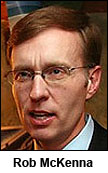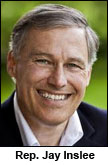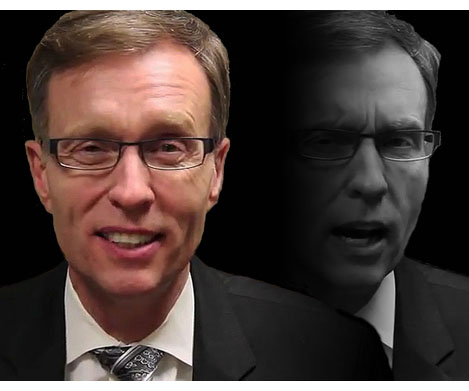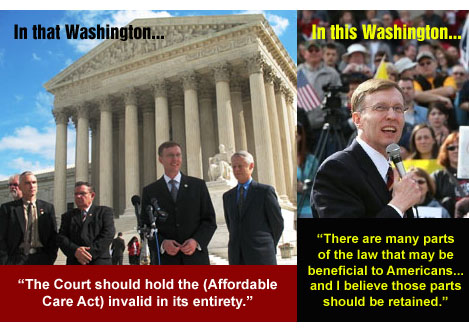ELECTION
Which Rob McKenna can voters believe?
 On unions, like health care, the Republican’s talking points flip-flop depending on the audience, but his actions are clear.
On unions, like health care, the Republican’s talking points flip-flop depending on the audience, but his actions are clear.
By DAVID GROVES
The Stand
OLYMPIA (June 11) — The state’s biggest newspapers all published the same story on Sunday about how both gubernatorial candidates, Democrat Jay Inslee and Republican Rob McKenna, vow that Washington state will not suffer a divisive fight over collective bargaining similar to Wisconsin’s if they are elected. For Inslee, this is no surprise. But for McKenna, it represents another “flip” following his previous flip-flop on the issue.
 As the story notes, “Democrat Jay Inslee has positioned himself as the defender of collective bargaining, calling it a ‘fundamental right’.” There’s no doubt where he stands on this issue. Inslee has a long record in both Congress and the State Legislature of voting to protect and strengthen the right of workers to freely choose whether they want to unionize and bargain collectively. It’s one of several reasons, unions from across the state have voted to make him labor’s endorsed candidate for governor.
As the story notes, “Democrat Jay Inslee has positioned himself as the defender of collective bargaining, calling it a ‘fundamental right’.” There’s no doubt where he stands on this issue. Inslee has a long record in both Congress and the State Legislature of voting to protect and strengthen the right of workers to freely choose whether they want to unionize and bargain collectively. It’s one of several reasons, unions from across the state have voted to make him labor’s endorsed candidate for governor.
McKenna, however, has changed his story on the issue of collective bargaining depending on the audience.
Earlier this year, when tens of thousands of Wisconsin citizens were protesting outside their State Capitol over Gov. Scott Walker’s attack on public employees’ bargaining rights, McKenna said that he considered collective bargaining a right. But when challenged by right-wing supporters on that statement, he clarified that collective bargaining is merely a “statutory right” (meaning, current state law) and he vowed to make changes to those laws. When speaking before a group of Republicans, without knowing he was being recorded, McKenna said public employee unions are “dangerous.”
Now, in this week’s interview, McKenna is saying state employees have no reason to fear him if he’s elected governor and he once again calls collective bargaining a right.
“Collective bargaining is internationally recognized to be a fundamental human right alongside the freedom of association,” said Jeff Johnson, President of the Washington State Labor Council, AFL-CIO. “But Rob McKenna changes his position on this basic right, depending on the audience. That alarms people in Washington — a strong pro-union state where 1 in 5 workers are members — especially given the aggressive national attack by the Republican Party against the freedom to form unions.”
Nothing to fear… but your jobs
 As for the fresh assurance in Sunday’s report that state employees having “nothing to fear” under a McKenna administration, apparently that doesn’t include fear of losing their jobs. In his campaign kickoff speech, McKenna said he wants to get rid of more state employees: “Fewer people doing more work — that’s the answer.”
As for the fresh assurance in Sunday’s report that state employees having “nothing to fear” under a McKenna administration, apparently that doesn’t include fear of losing their jobs. In his campaign kickoff speech, McKenna said he wants to get rid of more state employees: “Fewer people doing more work — that’s the answer.”
With the latest round of 1,266 state employee job cuts, the number of state employees in Washington has already been cut to the lowest level in a decade or more. And that has occurred amid a recession and state population increases — about 1 million more state residents over the past decade — which have combined to create a greater demand for public services. As private sector hiring has picked up in the past year, continuing government layoffs have been cited as a drag on the state and national economies that is prolonging the recession and slowing private-sector growth.
Like Gov. Walker, McKenna blames state employees and their overly generous compensation for recent state budget crises, not the recession caused by Wall Street malfeasance and the subsequent housing crisis. McKenna vows to bargain more aggressively than previous governors to force state employees to pay more for health care and to cut state pension benefits.
Since the recession began four years ago, state employees have not had a cost-of-living wage increase while the costs of gas, food and other basic living expenses have increased substantially. In fact, their pay has been cut 3% with unpaid furlough days. In addition, state employees’ health premiums have increased 25% and they must now pay substantially higher co-pays and other out-of-pocket health costs.
All of these concessions have been achieved through the re-negotiation of collective bargaining agreements between state employee unions and the administration of Democratic Gov. Chris Gregoire. But McKenna wants state employees — those who still have jobs — to sacrifice more, and he implies they’ve gotten off easy in negotiations with Democratic governors.
“It’s pretty clear that Rob McKenna wants government on the cheap — wage cuts and fewer benefits for teachers, firefighters, nurses, home care workers, correctional officers, and all other public employees,” Johnson said. “That’s bad news not just for those workers and their families, but also for the quality of public services in Washington state.”
Campaign of fear, or facts?
In Sunday’s article, McKenna accuses unions and Inslee of “waging a campaign of fear” by portraying him as anti-union. But as The Stranger reports, it would be hard to describe his voting record as a King County Council member any other way:
As a councilman, on five separate occasions, McKenna refused to approve collective bargaining agreements between the county and public workers, opposing contracts with animal control officers, social workers, and others. He led efforts to prevent the county from doing business with union shops, bizarrely disparaging as ‘racist and sexist’ an ordinance requiring the county to hire union apprentices. In 1998, McKenna even voted against a motion that urged an employer to (gasp) ‘bargain with its employees in good faith’ and innocuously supported the ‘fair treatment of workers.’ And while McKenna likes to talk the talk on government spending, as chair of the council’s budget committee in 2001, he proposed swiping money from a fund set aside to pay scheduled raises to unionized workers while actually increasing spending.
McKenna’s opposition to unions has continued as Attorney General. Backed by the anti-labor Evergreen Freedom Foundation and the National Right-to-Work Legal Defense Foundation, he fought to appeal a State Supreme Court ruling that had granted teachers’ unions the right to use members’ dues for political purposes. The report goes on:
If his anti-union sympathies weren’t obvious enough, in 2010, acting as the keynote speaker at an Association of Washington Business luncheon, McKenna presented its better workplace award to Cairncross & Hempelmann, a law firm that advises managers on how to see the “warning signs of union organizing efforts” and “put policies in place to limit unionization efforts on your properties.” Because nothing makes a workplace “better” like busting unions.
Actions speak louder than words
McKenna already stands accused of publicly contradicting himself for political reasons on key election issues.
 Against the wishes of the governor and legislature, McKenna signed on to a federal lawsuit with other conservative State Attorneys General that aims to repeal, in its entirety, the federal Affordable Care Act. A U.S. Supreme Court ruling on the lawsuit is imminent.
Against the wishes of the governor and legislature, McKenna signed on to a federal lawsuit with other conservative State Attorneys General that aims to repeal, in its entirety, the federal Affordable Care Act. A U.S. Supreme Court ruling on the lawsuit is imminent.
But on the campaign trail, McKenna has told voters that he only wants to repeal requirements that people purchase health insurance, and not the reform’s popular provisions, such as banning insurance companies from imposing lifetime coverage limits, allowing children to retain coverage on their parents’ policies through age 25, and closing the costly Medicare “donut hole” for seniors.
It’s not just McKenna’s critics who accuse him of political doublespeak on the health care issue, it’s also King County Superior Court Judge Sharon Armstrong. In a ruling that sided with McKenna on the case in question, the judge ruled that McKenna’s “consistent legal position” has been to repeal the entire health reform law and that his campaign talk of maintaining its popular provisions were merely “political statements.”
Apparently, the courts agree, Rob McKenna’s actions speak louder than his words.





